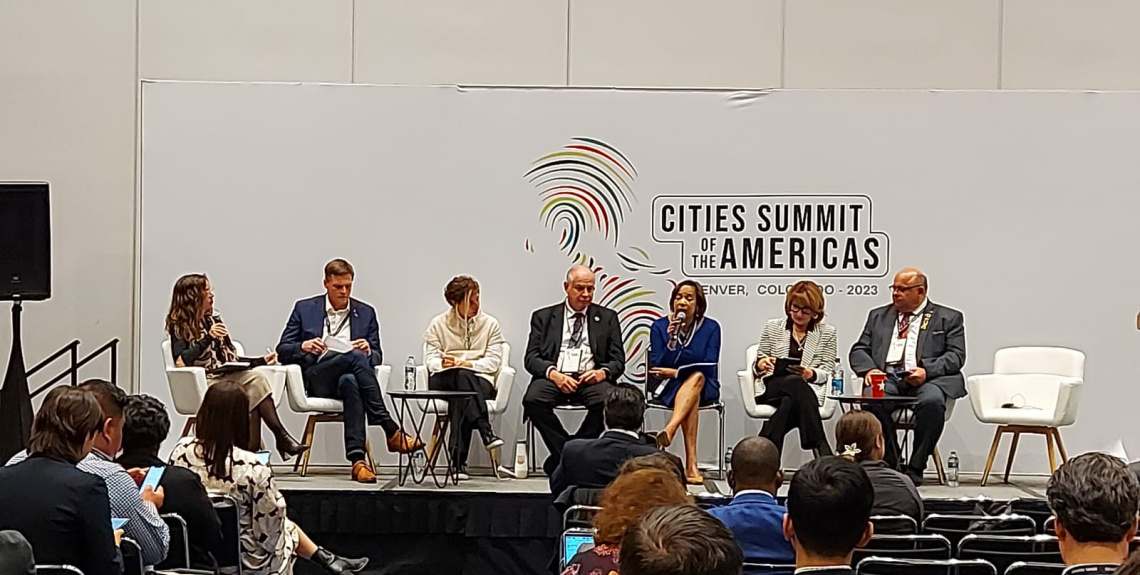The I Cities Summit of the Americas, held in Denver in April 2023, set a new milestone in our advocacy for localizing the housing agenda with a caring approach for all. The occasion was the opportunity to open a regional dialogue in the field for the first time, thanks to the session "Cities for Adequate Housing: Joining Forces Towards Local Housing Systems that Care for All."
United Cities and Local Governments (UCLG), the Latin American Federation of Cities, Municipalities, and Associations (FLACMA), and our Committee on Social Inclusion, Participatory Democracy, and Human Rights (CISDPDH) led the session. It was also chaired by Leilani Farha, Global Director of The Shift and former UN Rapporteur for Adequate Housing, and Carolina Cosse, Mayor of Montevideo and President of UCLG. In addition, mayors from the region participated, including Victoria Woodards, President of the National Leagues of Cities and Mayor of Tacoma; Mitch Roth, Mayor of Hawaii; Berry Vrbanovic, Mayor of Kitchener; and Charlie Clark, Mayor of Saskatoon.
Everyone has the right to a standard of living adequate for the health and well-being of themselves and of their family, including food, clothing, housing and medical care, and necessary social services. - Article 25 of the Universal Declaration of Human Rights.
This year marks the 75th anniversary of the Universal Declaration of Human Rights, so it is worth remembering that "housing is a human right that all forms of government must support," as UCLG Secretary General Emilia Saiz pointed out.
Despite being a human right, "housing has become a major economic driver, but also an inequality driver in our cities. We are witnessing how financial actors are invading this sector," said Leilani Farha. The financing of what should be a human right lies behind the housing crisis and emergency, unfortunately, suffered by billions of people worldwide.
Currently, 1.6 billion people inhabit inadequate housing (UN, 2017), almost one-seventh of the world's population. One in eight people reside in informal settlements (UN, 2021) and some 150 million people live in conditions of homelessness, without access to water or sanitation services, according to The Shift. Given this situation, Charlie Clark, Mayor of Saskatoon (Canada), posed the following question: How do we get people to think about the housing emergency with the same urgency as the climate emergency?
In the face of this neoliberal housing model, it is necessary to foster "a new social pact based on care and feminism, which promotes fairer, more supportive and egalitarian societies," as UCLG President Carolina Cosse stressed. She recalled that in UCLG, we are guided by the conviction to build housing systems capable of caring for all the people who live in our cities.
We have joined this struggle from the Committee, where "we work to advance the right to adequate housing, not only as an international law but also as a tool to create better policies," explained our coordinator Amanda Fléty.
Localizing the housing agenda for a model that cares for all people is urgent, especially because "what cities can bring to the international debate are not only local realities but also local innovations," as defined by our coordinator.
Carolina Cosse shared about public policies in Montevideo (Uruguay) to help local cooperatives finance and build adequate housing. The mayor remarked that this effort has been possible thanks to multi-stakeholder cooperation and multilevel governance.
An all-community approach, working in partnership with the national government and Canadian municipalities, has helped advance the right to adequate housing, as Berry Vrbanovic, Mayor of Kitchener (Canada), recounted. He knows that "no problem can be solved by any one actor or level of government."
In partnering with stakeholders, it is essential to pay special attention to historically marginalized groups, such as indigenous communities, which in Saskatoon (Canada) represent 80% of the homeless population. In the face of these structural injustices, Charlie Clark, mayor of Saskatoon, challenged those present to imagine what their respective cities would be like if no one lived without a home:
"Knowing that there are people who are homeless inevitably affects all of us, without us realizing it, it causes us great sorrow inside because we know it's not right. Imagine all that we could do if we could act from the mildness of knowing that everyone has a proper home."
The mayor of Saskatoon emphasized how it is necessary to work directly with these communities to find solutions that work for them.
As Victoria Woodards, Mayor of Tacoma (USA), summarized, "Invest in people, build partnerships, and you will have endless opportunities." In this city in Washington State, they have opted for an affordable housing strategy with a 10-year plan while considering that it is crucial to keep the existing housing in good condition.
Ensuring a comprehensive, long-term approach to housing is undoubtedly one of the critical pillars in addressing this current crisis. As Mitch Roth, Mayor of Hawaii (USA), said:
"Sustainability means being able to raise our kids on our island. And they need to be able to raise their kids on our island. And this won't happen unless we have affordable housing."
This local representative invited us to think about guaranteeing access to adequate housing for all people as "a lens through which to look at the rest of society's challenges and the policies that are defined to respond to them."
Following this open regional dialogue at the Cities Summit, the UCLG Housing Community of Practice will continue to work with further milestones on the horizon, including a virtual working meeting to be held on May 24. The objective is to continue advancing a shared strategy to contribute from the international level to advance housing rights at the local level.


